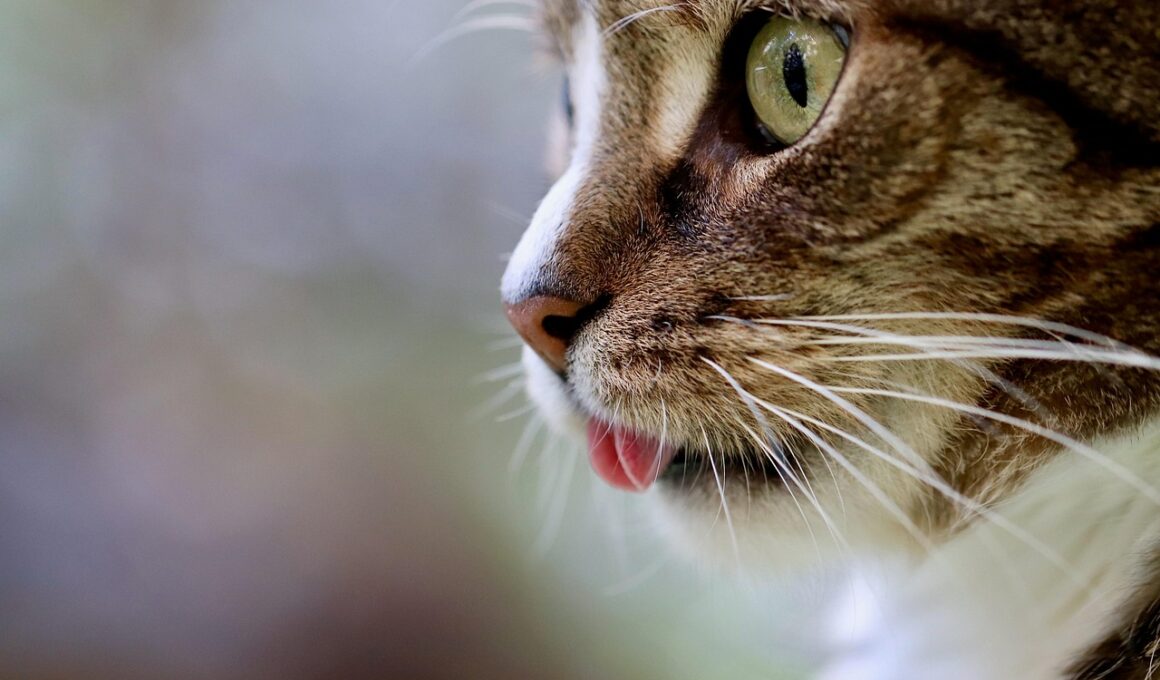The Impact of Vaccinations on Managing Chronic Diseases in Cats
Vaccinations play a crucial role in the health and overall well-being of cats, especially in managing chronic diseases. Vaccines help to prevent infectious diseases that can exacerbate chronic conditions. For cats suffering from illnesses such as diabetes, chronic kidney disease, or respiratory problems, being vaccinated can reduce the risk of contracting opportunistic infections. Ensuring your cat is up-to-date on vaccinations is an essential component of a comprehensive health plan. Regular veterinary visits can help determine the appropriate vaccination schedule based on your cat’s health status and lifestyle. It is important to be aware that certain vaccinations are critical for maintaining immunity against serious, contagious diseases. For instance, strategies involving feline leukemia virus (FeLV) and feline immunodeficiency virus (FIV) vaccinations foster better health outcomes over time. The relationship between vaccinations and chronic disease management is increasingly recognized among veterinarians, highlighting the need for routine preventative care. By being proactive with your cat’s vaccination regimen, you can potentially prevent complications that may otherwise arise from these chronic ailments and maintain a higher quality of life for them.
While vaccinations are essential for preventing infectious diseases, they also contribute to the management of existing chronic conditions. Cats with chronic illnesses are often more susceptible to infections; hence, vaccinations are particularly vital. A comprehensive vaccination program can bolster their immune systems, assisting them in battling chronic diseases more effectively. Moreover, it is crucial to discuss vaccination strategies with your veterinarian, especially when your cat has a pre-existing condition. Each cat’s health profile may require customized vaccination protocols that take individual risks into account. Regular health checks and blood work can identify any underlying issues that need to be addressed before vaccination. Additionally, understanding the vaccine schedule helps owners anticipate and prepare for their pet’s needs. In many cases, cats may require booster shots or additional vaccinations based on previous health challenges. The use of vaccines may also alter underlying disease processes, leading to improved health metrics. Timely vaccinations can reduce periods of discomfort and expenses related to secondary infections, maintaining a stable health status and promoting longevity in cats suffering from chronic diseases.
Types of Vaccinations Important for Cats
There are various types of vaccinations critical for cat health, which must be understood by pet owners to make informed decisions. Core vaccines are recommended universally; they include feline panleukopenia (distemper), feline herpesvirus, and feline calicivirus. These vaccines protect against serious diseases that can threaten the lives of cats of all ages. Non-core vaccines are depending on geographical area and lifestyle—for example, FeLV is essential for cats that spend time outdoors, as they are at a higher risk of exposure. Vaccinations should not be viewed as standalone treatments but as part of a holistic strategy that incorporates nutrition, exercise, and consistent veterinary care. By discussing with your veterinarian, pet owners can determine which vaccines are particularly beneficial based on their environment and their cat’s health status. Keeping vaccinations updated enhances community health by reducing the spread of infectious diseases. It is also essential to understand post-vaccination effects; while many cats may show mild side effects, severe reactions are rare. Monitoring your cat after vaccinations enables prompt evaluation for any adverse effects, ensuring peace of mind for owners and supporting well-being.
Crucially, vaccination decisions should be based on a thorough veterinary consultation that evaluates each cat’s unique health circumstances. The approach to vaccinations must be tailored, especially for older cats or those undergoing treatments for chronic diseases. With a customized vaccine plan, veterinary professionals can significantly mitigate health risks related to chronic illness exacerbation. Vaccines work best when coupled with other preventive measures, which means regular screenings for chronic conditions are equally necessary. Owners should recognize that their cats may experience varied immune responses to vaccinations due to health status variation. Therefore, a proactive approach towards vaccinations is not merely preventative; it is integral to the overall management of chronic conditions. Responsible pet ownership also involves familiarizing oneself with local regulations concerning vaccinations and potential disease risks. Furthermore, owners should engage in discussions about combined vaccines or titer testing, which can assess existing antibody levels before vaccination, determining necessity or frequency. Keeping informed and collaborating with your veterinarian is essential for ensuring your cat’s health is prioritized throughout their lifespan.
Monitoring and Follow-Up Care
Post-vaccination monitoring is critical in managing your cat’s health, especially when they have chronic diseases. Patients with established health concerns may react differently to vaccines, making it essential to observe for potential side effects. Signs of discomfort may include lethargy, mild fever, and swelling at the injection site, which typically resolve quickly. However, as advocates for our pets’ health, it’s essential to promptly communicate any alarming symptoms to the veterinary team, such as persistent lethargy or unusual behaviors. Achieving successful outcomes hinges on the implementation of follow-up care—a key strategy in disease management post-vaccination. Regular vet visits help track overall health improvements and manage chronic conditions effectively. These checks are an opportunity to reassess vaccine requirements, blood tests, and treatments that align with the evolving health status of your cat. Additionally, owners should be encouraged to keep detailed records of vaccinations, including dates and any reactions observed. Using reminders for future appointments ensures that your feline friend remains on a clear health trajectory. A proactive stance on monitoring your pet’s health leads to considerable long-term benefits and enhances their quality of life significantly.
Understanding the suitable vaccination schedule is crucial for cats with chronic diseases. Your veterinarian can provide recommendations tailored to specific health conditions, aiming to minimize complications. Timing your cat’s vaccinations coinciding with other health treatments can optimize their overall health outcomes. For example, vaccinations may need to be strategically timed when managing medication for chronic diseases to ensure an effective immune response. Each vaccination helps in building immunity, counteracting conditions that could easily compromise their well-being if left unchecked. Moreover, vaccinations can reduce the need for emergencies related to contagious diseases, thereby maintaining long-term disease management strategy effectiveness. Combining vaccinations with nutritional support and specialized diets can help mitigate some chronic illnesses. This holistic approach is made successful with routine communication with veterinary professionals and attentiveness to subtle behavior changes. Integrating this support can lead to improved vitality and energy levels, impacting your cat’s overall quality of life. Keeping a close eye on their health and seeking veterinary advice promptly can ensure that routine vaccinations remain one integral tool in the larger strategy for managing chronic conditions effectively.
Conclusion
To summarize, vaccinations are a vital aspect of managing chronic diseases in cats, leading to healthier and longer lives. Proactive vaccination strategies combined with regular medical care can dramatically reduce the risk of complications associated with chronic conditions. By prioritizing vaccinations, cat owners not only enhance their pets’ immediate health but foster a healthier community. Understanding the importance of core and non-core vaccines, alongside potential individualized vaccination plans, empowers pet owners to act decisively. This understanding encourages better health discussions with veterinarians, ensuring that personalized care is at the forefront of treatment strategies. Owners should remember that chronic disease management often involves a collaborative approach, incorporating protective measures and ongoing assessments into an action plan. Engaging with veterinary professionals and advocating for care initiatives are key components in promoting both individual and collective well-being. By creating robust healthcare routines that include vaccinations, cat owners can help their beloved pets navigate chronic diseases more gracefully. Predetermined vaccination schedules will enhance your cat’s health and overall happiness, underscoring a lifelong commitment to proactive and preventative care.
In conclusion, as responsible pet owners, understanding the entirety of managing chronic diseases in cats emphasizes the significance of vaccinations in promoting their well-being. Keeping cats vaccinated is key in preventing potentially life-threatening infections that could complicate existing health problems. Regular veterinary consultations and tailored vaccination plans ensure that cats remain as healthy as possible throughout their lives. Timely vaccinations not only help protect individual cats from infectious diseases but also contribute to community health by limiting disease transmission. Collaborating with veterinary professionals and staying informed about vaccination recommendations will facilitate a better quality of life for cats managing chronic conditions. Keeping an open dialogue with veterinarians adds invaluable insights that enhance treatment plans based on changing health statuses. By fostering awareness and knowledge about effective vaccination strategies, owners can significantly mitigate health risks to their pets. Ultimately, investing in regular vaccinations as part of a comprehensive care approach leads to happier, healthier cats. Prioritizing preventative care through effective vaccination programs can create lasting positive impacts on your feline companion’s health and longevity, setting the stage for a brighter future.


